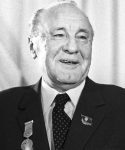 János Kádár (1912-1989) was a Hungarian communist politician and the leader of Hungary between 1956 and 1988. Kádár was born in the coastal resort of Fiume, the child of an unmarried soldier and a chambermaid. Raised by his mother and foster parents, Kádár received some formal education before obtaining an apprenticeship as a typewriter mechanic. As a teenager, Kádár joined a trade union and, after reading Karl Marx, a banned communist group. He was arrested several times in the early 1930s and spent more than two years in prison. When Nazi forces occupied his country during World War II, Kádár joined the Hungarian Front resistance. He also ascended through the ranks of the Hungarian Communist Party, joining its Central Committee in 1942, becoming First Secretary in 1944 and Deputy General Secretary in 1946. Like Joseph Stalin, Kádár’s reputation was based on his skill as an administrator and an organiser of people.
János Kádár (1912-1989) was a Hungarian communist politician and the leader of Hungary between 1956 and 1988. Kádár was born in the coastal resort of Fiume, the child of an unmarried soldier and a chambermaid. Raised by his mother and foster parents, Kádár received some formal education before obtaining an apprenticeship as a typewriter mechanic. As a teenager, Kádár joined a trade union and, after reading Karl Marx, a banned communist group. He was arrested several times in the early 1930s and spent more than two years in prison. When Nazi forces occupied his country during World War II, Kádár joined the Hungarian Front resistance. He also ascended through the ranks of the Hungarian Communist Party, joining its Central Committee in 1942, becoming First Secretary in 1944 and Deputy General Secretary in 1946. Like Joseph Stalin, Kádár’s reputation was based on his skill as an administrator and an organiser of people.
Kádár maintained close ties with Moscow and so was an important figure in the ‘Sovietisation’ of Hungary in the late 1940s. Between 1948 and 1950 he served as the interior minister in Mátyás Rákosi’s government. Stalin’s purges triggered political instability in Hungary and led to Kádár’s resignation in May 1950. Falling foul of Rákosi, Kádár was arrested, tortured and sentenced to life in prison after a show trial. He was released in July 1954 on the orders of Imre Nagy, following the death of Stalin. Kádár was welcomed back into public life, serving as party secretary in Budapest and winning supporters among Hungarian unionists. In October 1956, in the midst of the Hungarian Uprising, Kádár became the party’s General Secretary and a member of Nagy’s cabinet. Kádár remained concerned about Nagy’s proposed reforms, however, believing they went too far. On October 31st Soviet leaders identified Kádár as the logical figure to replace Nagy and end the Hungarian revolt.
After Warsaw Pact forces invaded Hungary in early November 1956, Kádár took control of the government with the backing of Moscow. One of his first moves was to reform the party and unveil a 15-point program for restoring socialism in Hungary. Kádár also oversaw the brutal repression of Nagy and his supporters, most of whom were tried and executed in 1957-58. In 1962 Kádár declared the counter-revolution over and announced an amnesty for those involved in the 1956 uprising. During the mid-1960s his government began to implement what became known around the world as ‘goulash communism’: an economic policy that combined centralised socialism with free-market principles, along with the relaxation of political repression and greater freedoms for the Hungarian people. As a consequence, Hungary’s standards of living improved significantly and Kádár became popular with his own people. He remained the most powerful figure in Hungarian politics until 1988 when popular demands for even greater reform led to him being sidelined from the party leadership. Kádár died in Budapest in July 1989.
Content on this page is © Alpha History 2018-23. This content may not be republished or distributed without permission. For more information please refer to our Terms of Use. This page was written by Jennifer Llewellyn and Steve Thompson. To reference this page, use the following citation:
J. Llewellyn & S. Thompson, “Janos Kádár”, Alpha History, accessed [today’s date], https://alphahistory.com/coldwar/janos-kadar/.
